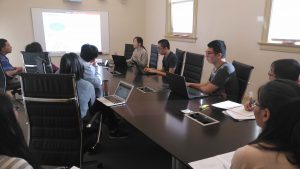Invited Talk, 12th October 2017
Talk by Dr. Shiyu Wang on “Model learning in Latent Class analysis: A higher-order hidden Markov model with covariates”.
» Abstract
The cognitive diagnostic model (CDM) is a type of restricted latent class model which can generate a fine breakdown of the skills or attributes possessed by students that affect performance. The application of the traditional CDMs mainly focuses on providing a classification of skills or attributes at a given point in time. However, in the context of education students usually learn and master content over time. In this talk, we introduce a family of learning models that integrates the CDM framework with a higher-order, hidden Markov model (HO-HMM) for attribute transitions. This new modeling framework allows us to model transitions from non-mastery to mastery of an attribute as a function of student covariates. A Bayesian formulation is adopted to estimate parameters from the proposed learning model. We apply this model to analyze students’ learning trajectories in a computer-based 3-D spatial skills cognitive diagnostic assessment with learning tools. The spatial reasoning example indicates the benefits of practice, and the value of knowing some of the attributes, on the probability of making a transition to a master of a fixed attribute. It also revealed significant heterogeneity in individual learning rates. Students’ demographic variables, such as country, gender, and major, are incorporated in the proposed model to better evaluate the designed intervention and investigate the impact of the social factors.

» Short Bio
Dr. Shiyu Wang is an Assistant Professor of the Quantitative Methodology Program, the Department of Educational Psychology at the University of Georgia. She is also the adjunct Assistant Professor of Statistics at UGA. Before moving to this position, she got her PhD in statistics from the University of Illinois at Urbana-Champaign. Dr Wang’s primary research interests lie broadly in multivariate latent variable methodology for the measurement of complex traits and behaviors with application to educational and psychological assessment. Her current research interests are centered on two areas: statistical inference in latent variable modeling and adaptive testing, including item response theory, cognitive diagnostic modeling, computerized adaptive testing, and multistage adaptive testing.
Invited Talk, 29th September 2017
Talk by Dr. Weihua An on “Fitting ERGMs on Big Networks”.
» Abstract
The exponential random graph model (ERGM) has become a valuable tool for modeling social networks. In particular, ERGM provides great flexibility to account for both covariates effects on tie formations and endogenous network formation processes. However, there are both conceptual and computational issues for fitting ERGMs on big networks. Dr. An describes a framework and a series of methods (based on existent algorithms) to address these issues. He also outlines the advantages and disadvantages of the methods and the conditions to which they are most applicable. Selected methods are illustrated through examples.
» Short Bio
Dr. Weihua An is an Assistant Professor of Sociology and Quantitative Theory and Methods at Emory University. His main research areas are network analysis and causal inference. In network analysis, he studies theories and applications that treat social networks as a medium for social influence and a platform for social surveillance. In causal inference, he studies matching and propensity score methods, instrumental variable methods, and causal inference with treatment diffusion. His research also connects the two areas by examining causality in networks and employing networks to improve causal inference.
Dr. Weihua An’s personal webpage